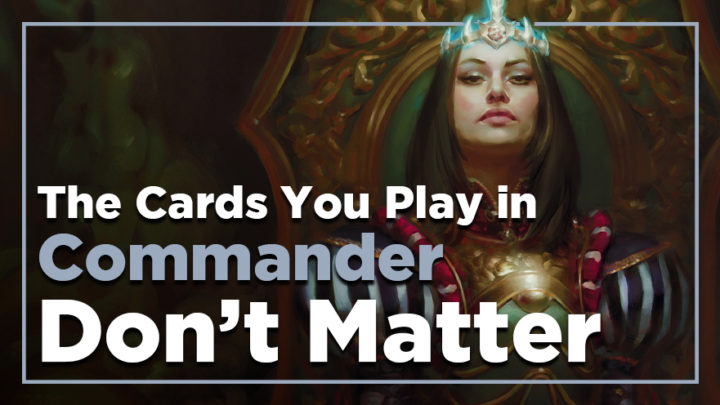The cards you play in Commander don’t matter, and I don’t mean that from a “play whatever you like” perspective. While it is true that we could all benefit from relaxing things from time to time — playing more pet cards and fewer “all-stars” — that’s not what I’d like to talk about today.
Now that I’ve reeled you in with such an outlandish statement, I want to get into it: the cards you play in Commander don’t matter, at least not as much as:
- What your opponents have played
- What your opponents could play
- What your opponents didn’t play
Lessons from Limited
These heuristics are most commonly applied in games of Limited. Take a common Limited scenario – you play game 1, and you get beaten by a creature with flying. You don’t have any creatures with reach, and you’re a little light on removal. So, as you shuffle up for game 2, you tell yourself that unless a creature is close to winning the game for the opponent, you won’t use your removal too soon; if you do have any of your own flying creatures, you’ll hold back on casting them or blocking with them until your opponent plays their bomb flyer to give you the maximum chance to win the game.
In this way, you’ve considered both what your opponents have played, and what they could play. You’ve adapted your game plan to take this into consideration, and you’re feeling more confident.
Commander is more complicated than Limited, I’ll give you that – the four-dimensional chess skills needed to evaluate a gamestate can be quite demanding – but applying lessons from 1v1 formats can be very useful.
One of the biggest mistakes in EDH is over-committing resources to the board when you’re not in the final stretch. In Limited, not every set has a wrath to watch out for, but some do, so playing out your hand when you’re already winning can be detrimental. (It can also show your opponent more of your deck for game 2.)
Meanwhile, in Commander, you’re always playing with a ticking clock in the background – that board will definitely Buckaroo when there’s too much on it! Most players are cognizant of this particular element of gameplay, and so they will (usually) try to be aware of it. Without realizing it, they are placing weight on what the opponents could play.
Taking this one step further, we can extrapolate that if an opponent has played a wrath, it’s safer to deploy your more powerful creatures. Likewise, if multiple opponents didn’t play a wrath to manage another players’ board presence, it’s also a lot safer for you to deploy your own threats, depending on how likely each player is to draw into a wrath. Notice how each of these decisions is based entirely on what your opponents are doing, and not the cards you have access to.
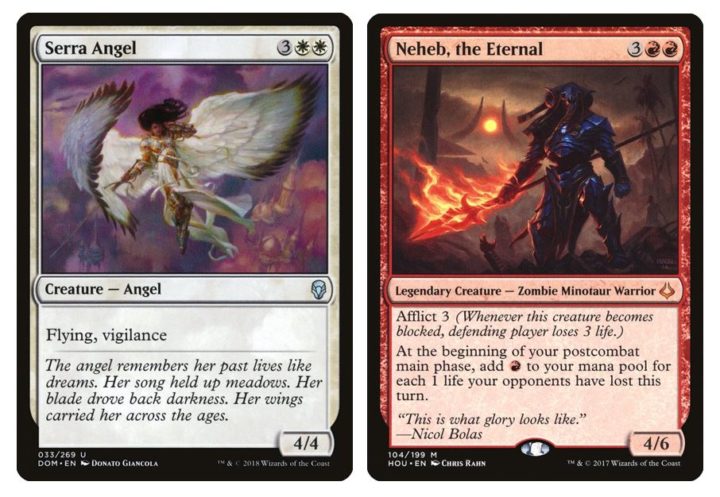
Whether you’re playing budget Magic and figuring out when to drop a Serra Angel, or playing a high-powered Ilharg deck and figuring out when to drop Neheb, the Eternal, the decision-making is largely the same.
Mulliganing
Resource management matters, but so, too, does sequencing. Without good sequencing, you’re always at the mercy of what your opponents are doing, instead of being able to anticipate how things might play out beyond just one cycle of the table. Sequencing starts with mulliganing.
If we drop back to our previous Limited example, you may also decide during sideboarding that it’s simply easier to lower your mana curve and try to kill the opponent before their flyers become an issue. You’ve formulated a game plan.
Whichever option you take in our example is by the by, though — what matters is that you need to bring this kind of insight to a Commander table, and it’s this kind of insight that you need to fire up as soon as you sit down.
Take a look at the other decks at the table – are there any that are likely to be playing combos? Keep a hand with some interaction. Are there any likely to have a fast start? Make sure you have a decent amount of lands in your opener or other ways to catch up. Do you need to race any of the other decks?
Your starting hand needs to be correct for the table. Just as there’s no use keeping a slow hand versus artifact ramp decks, keeping a hand just because it has a Sol Ring — without calculating where the hand takes you, what you might need for interaction, or how much it can paint a target on your back — can also be a mistake. In essence: a game plan and interaction for what your opponents could play is often more important than the cards you want to play or open with.
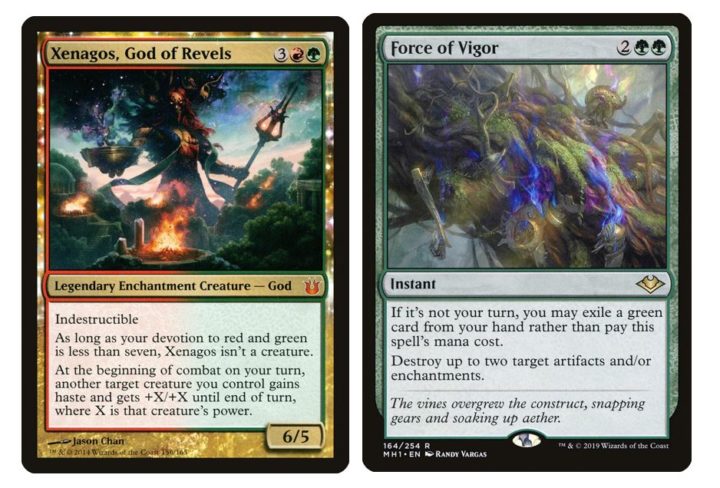
A great example of this is a game I played the other week. Despite opening strong with a Mana Crypt and a Mask of Memory with my Neheb, the Eternal deck, the Xenagos player at the table was rewarded by keeping a Force of Vigor and sacrificing some of their early velocity due to the strength of their interaction. They had a game plan, and it paid off.
Sequencing
You have to respect them “having it” a lot more in multiplayer Magic, as three players are going to hit “it” more often than one player ever could. As such, sequencing is incredibly important.
By calculating mana and plays multiple turns ahead, you can use your mana to the fullest. It’s widely accepted that the player that spends the most mana most efficiently usually wins a game of Commander, and you’d be surprised how minor inefficiencies and awkward sequencing can add up to missed opportunities.
Smothering Tithe by Mark Behm
These missed opportunities can be hard to see while playing a game, but the most obvious example that all players follow is to play tapped lands as soon as possible in order to maximize the chances they can play with all of their mana on turns five and six.
Though this part of gameplay doesn’t involve your opponent directly, it does contribute to our overall missive of concentrating on your opponents. By sequencing with intent, and by making the most of your mana, you don’t have to spend mental energy and sometimes anguish over something you can’t control, which frees up time to focus on the way the game is going instead. If you have the right amount of mana on a crucial turn, you can more readily react to the opponent, and there’s less chance you end up tilting.
Tempo
Hand in hand with sequencing is the concept of tempo. In EDH, you can’t set all your opponents back on resources as easily as you could in 1v1 Magic. The decks are more consistent, with more card advantage, and you’re also effectively playing against three people trying to stop you. There are telltale tempo indicators, though, and you should be aware of them.
One of the best ways to tell what your opponents haven’t played is by observing the tempo of the game. To figure it out, you need to know when the dull spots of a game are, and figure out if opponents are playing the right cards at the right times.
If opponents are drawing cards or playing Planeswalkers, or trying to resolve a strong enchantment after a board wipe, that’s generally to be expected. It’s safe to assume they have a strong follow-up play, or they’re banking on using the interaction in their hands to begin to pull away.
If they aren’t, and are only playing an underwhelming creature, then it’s safe to assume that they don’t have anything (if low on cards), or that they’re playing conservatively (if they have three or more cards left in hand).
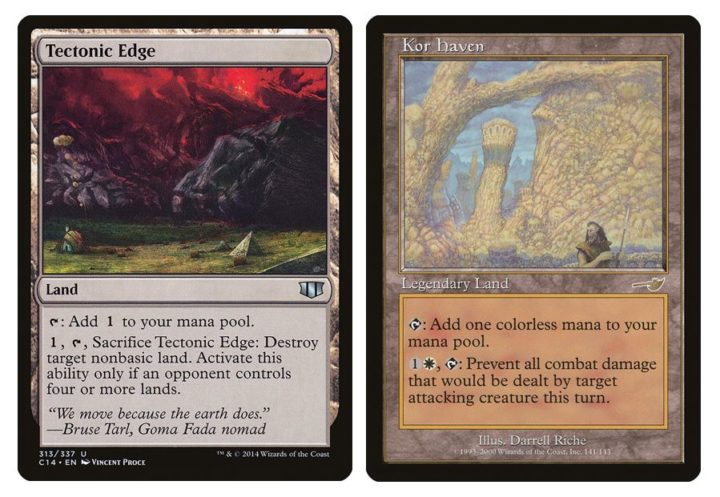
Conversely, past a certain point, you can’t take your foot off the gas to ramp or durdle, or you risk losing too much tempo. A game I played recently involved a player using a Tectonic Edge on the fourth land I had played, a Kor Haven. While Kor Haven was good on the current board, it was an aggressive play, and it actually knocked my tempo back so far that I was out of contention for the game due to not having further land drops to follow it up with.
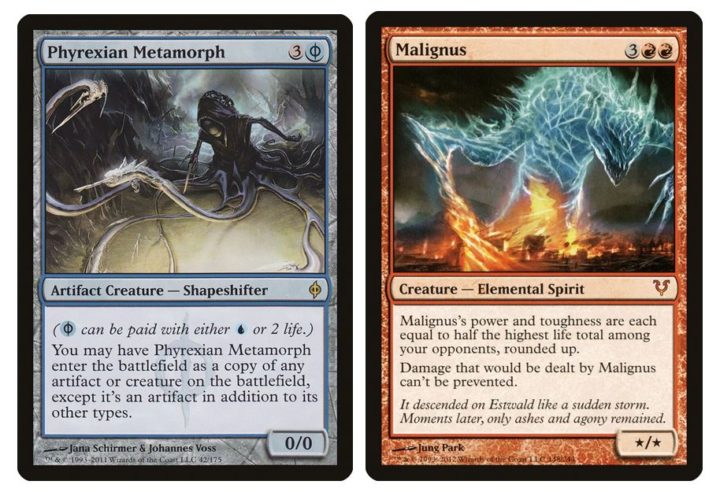
On the following turns, instead of deploying the two pieces of ramp I’d intended to, I was forced to play one spell a turn, playing clone effects like Phyrexian Metamorph to provide blockers for the haymakers my opponents were playing. Sometimes the answer to a Malignus is a Malignus!
While sometimes you absolutely don’t have a choice in what to play, you do always have a choice in when to play each of your cards. Though I knew that I’d much rather have been playing my ramp that turn, my best out to survive was to play blockers and hope to hit some lands off the top.
Knowing when you can make plays is more important than just being able to make them. Just as you craft your game based on what our opponents have played, could play, or didn’t play, they, too, build their outlook based on your actions. Consider what your plays communicate just as much as what your opponents’ plays communicate, and it will serve you well.
They Have to Have It
As we come full circle, it seems natural to go back to one of the classic phrases uttered by every Magic player ever: “They have to have it!”
Again, this focuses entirely on what your opponents are doing, and not what you’re doing. In Commander, you can keep a reasonably playable–or even good–hand. You can play your cards in the right order, with the right considerations for tempo, and you can save your interaction for the key moments.
But, ultimately, your victory often hinges on your opponents. You can still lose, despite doing everything right.
The journey to that end point is more complex than you’d think, though, and there are points during the journey that you can exploit knowledge to increase your chances of success.
For an opponent to “have it” late in the game, they first need to have had perfect threat assessment in order to not spend their answers earlier in the game. Though there are many players who accomplish what seems like near-perfect threat assessment, you can use that to your advantage.
By breaking parity with a huge threat during the mid-to-late-game, you can draw out your opponents’ interaction. This is best accomplished when you have other threats or ways to win to back it up, and the best examples of this are “lightning rod” cards. These are cards that must be answered, but might not be crucial to your win condition; think Avacyn, Angel of Hope.

This can also be achieved with combo pieces like Phyrexian Altar. By drawing the Krosan Grip out sooner, you can try and run your opponents out of answers.
Similarly, by way of attrition, you can run back-to-back board wipes or removal in order to exhaust resources. As we know when it comes to tempo, the best time to play any permanent is after a similar permanent was destroyed. If you can manufacture a situation in which an opponent is encouraged to overcommit, you can easily take advantage.
There are countless more examples I could cover, but my point is largely that producing these situations leads to knowledge exploitation, and knowledge wins games. By forcing opponents to “have it,” you can see what they could play, and more importantly, what they didn’t.
This, of course, can be accomplished by watching another player trying and failing to win, and that’s the most universal adoption of this particular stratagem.
The Art of War
So, you know what your opponents have played, what they could play, and what they haven’t played. Your information is as good as it gets, and now you can try to win. It’s not a stretch to say that some of what I have covered today is analogous to passages from Sun Tzu’s The Art of War, but I would like to close with one actual quotation.
“Victorious warriors win first and then go to war, while defeated warriors go to war first and then seek to win.”
This quote sums up why you should focus on your opponents and only engage when you have accumulated maximum knowledge about the battlefield.
Defeated warriors go to war first, and then seek to win; this is what happens when you don’t respect your opponents “having it,” and what happens when you focus solely on your own strategy without considering the wider context. By moving too soon, or by playing too greedily, we risk losing it all.
Victorious warriors win first, and then go to war; this is what happens when you have sculpted a game plan, observed your opponents, and struck when the odds were in your favor. It might take some politics to get to this point, but once you’re there — victory is all but yours.
A Note on Enabling
Before we close today, I’d like to make a quick note on the idea of “enabling.” Just as I think that most games of Commander are won based on your opponent’s actions, I think a good number of those games are won when your opponents’ actions directly enable you.
Two recent games of mine illustrate this well. The first was a game in which a God-Eternal Oketra player was playing Umbilicus. I was playing my Aurelia, the Warleader deck, which uses cards like Sun Titan, Karmic Guide, Stoneforge Mystic and Emeria Shepherd.
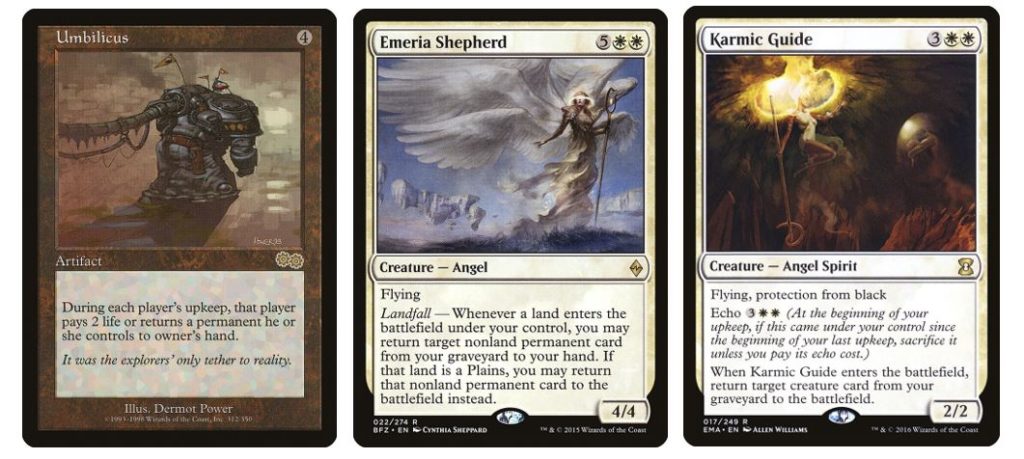
Despite all three players throwing removal at me, being able to gain value from the Umbilicus by re-triggering my ETB effects effectively out-paced their answers and won me the game. The player eventually realized they should bounce their own Umbilicus, but it was too late.

Similarly, I played a recent game with known glass cannon Neheb, the Eternal. Thanks to one player using their board wipe a turn too early, and playing their single target removal on a target that wasn’t Neheb, I was able to play my creatures out to try and combo off without fearing removal. I was also helped by another player playing War’s Toll, effectively turning off the interaction from my opponents in the turn I wanted to try and win.
In both these scenarios, what I did, and what I played, mattered less than what my opponents were doing. Their actions contributed to my win. This is one of the most common scenarios where a deck “overperforms” — other plays enable it, and it looks stronger or faster than it is on average. It also provides one final lesson today: be aware of how your plays may enable opponents, and how the likely plays the opponents could make can benefit you. Have recursion in hand? Force the board wipe.
In Closing
For many players, leveling up your gameplay in Commander is as easy as taking a step back and just “feeling” how a game is going. Anticipating rather than reacting is easy to grasp, but harder to put into practice.
I hope the tips and anecdotes I’ve shared today can help you improve your Commander gameplay. Let me know on Twitter how you’ve applied these strategies to take a win in your games!

Kristen is Card Kingdom’s Head Writer and a member of the Commander Format Panel. Formerly a competitive Pokémon TCG grinder, she has been playing Magic since Shadows Over Innistrad, which in her opinion, was a great set to start with. When she’s not taking names with Equipment and Aggro strategies in Commander, she loves to play any form of Limited.

